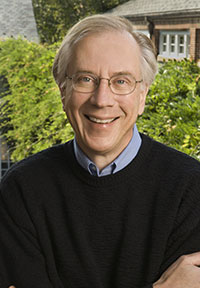No one escapes being affected by cancer. We all know someone, perhaps even a family member who has been diagnosed with cancer. According to the National Cancer Institute, more than 1.6 million people will be diagnosed with cancer in 2012. In fact, it is estimated that each person has a 41% chance of developing cancer during his or her lifetime. But new discoveries by researchers have started to change the outcome of a cancer diagnosis. In a recently published article in Nature, two researchers at CU boulder have found a possible solution hiding at the ends of our DNA. According to Professor Cech, "This is an exciting scientific discovery that gives us a new way of looking at the problem of cancer.” The researchers, Tom Cech and Leslie Leinwand, found the solution by studying how telomerase functions in our cells. In normal people, telomerase helps us keep our cells healthy and young.
At the ends of all of our chromosomes is a repeated sequence of DNA called telomeres. This sequence keeps the DNA safe from being damaged in cell division, but each cycle you end up losing some of them. Our bodies’ solution to stop the loss of telomeres is the use of telomerase. The telomerase comes along and adds back all the repeated sequences that have been lost, so the cell can keep copying itself perfectly. In the case of cancer, it’s a matter of too much of a good thing -- causing the cells to become immortal. In cancer cells, too much telomerase causes the cell to over-proliferate, leading to cancerous growth. Studying telomerase has always been a prime research area aimed at trying to slow down or stop the growth of cancer cells. Researchers believe that telomerase has played a role in 90% of the cancer cases. Before this breakthrough, research has been focused on slowing the enzymatic function of telomerase.
 |
| (Courtesy of Cech Lab) |
Professors Cech and Leinwand have discovered a way to stop telomerase from working. The scientists found a spot of amino acids on the end of DNA that telomerase uses to attach itself. When this area, called a TEL patch, is changed by even a single amino acid, telomerase is unable to bind to the chromosome and replace the lost bits of DNA. With each cell cycle, the chromosome will keep losing more of the telomeres that protect ends of chromosomes. Once the protective telomeres are gone, cell division will start degrading the chromosomes, thereby stopping cell growth.
"The way we blocked telomerase action -- by changing single amino acids on the surface of the protein-- is good for 'proof of principle,' but of little practical use," Cech wrote in an e-mail last week. "The next step is to use this information in drug discovery. That is, find a small molecule drug that binds to the telomere protein at the site we've identified, which should then block telomerase action in the cancer cells."
Tom Cech and Leslie Leinwand are both part of the BioFrontiers Institute at the University of Colorado, Boulder. The BioFrontiers Institute is in the Jennie Smoly Caruthers Biotechnology Building located at the CU-Boulder’s East Campus. The institute started from a 15 million dollar grant from the National Institute of Health.
The goal of the institute is to pursue research into human health and welfare in order to create new treatments and applications. The facility is organized around 4 different interdisciplinary focuses: Large Datasets and Genomics, Biophysics and Imaging, Chemical Biology and Drug Development, and Regenerative Biology. This facility officially transitioned from the Colorado Initiative in Molecular Biotechnology, into the BioFrontiers institute in 2011. The Jennie Smoly biotechnology building is 336,800-square-feet and is used for teaching and research.
Read our earlier blogs on the Biofrontiers Institute, the work of Drs. Cech and Lienwand, and the new biotech building at CU Boulder here.
Biotechnology Calendar, Inc. is in the business of bringing life science researchers together with scientific sales professionals to network and exchange valuable information about laboratory research and the latest tools and techniques for getting it done optimally. Now going into our 21th year of scientific event planning and marketing on research campuses across the US, we're looking forward to our next Boulder Bioresearch Product Faire™ show on the CU Boulder campus, to be held on June 19, 2013. See our 2013 schedule if you're interested in our events. For Boulder show information and funding data, click the button below:


